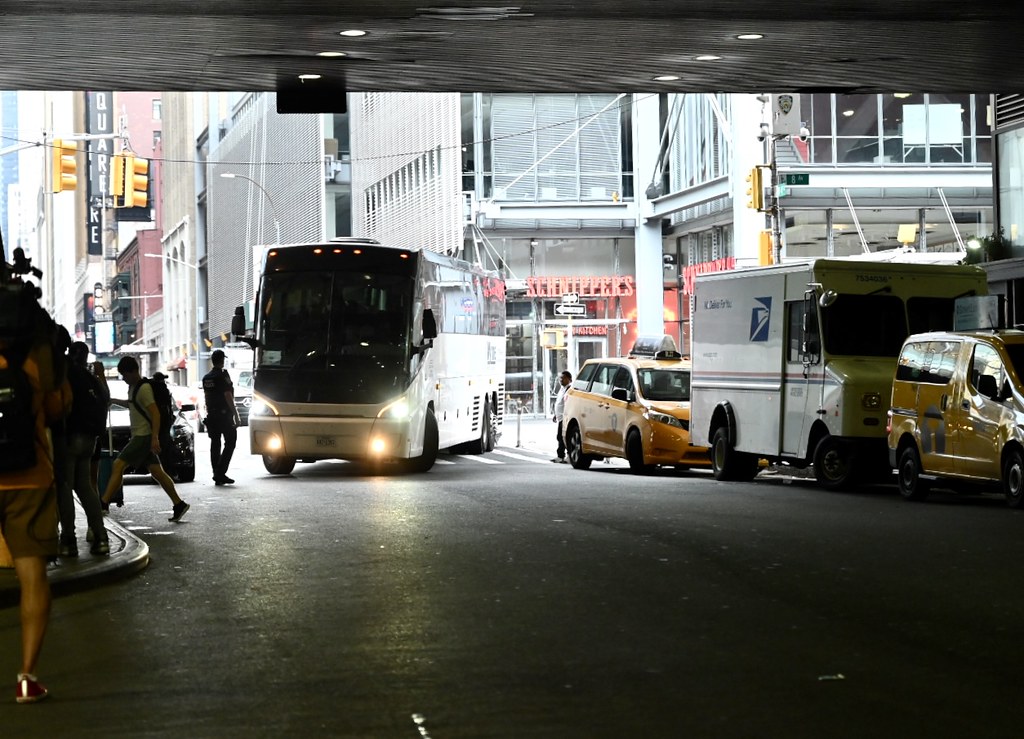Advocacy + Outreach · September 29, 2022
The Family from Venezuela: A Homecoming Story
New Yorkers have been seeing the headlines for months—thousands of migrants and asylum-seekers being bused to Manhattan from Texas and Florida, the city’s shelter and support services suddenly overwhelmed with the influx.
On Homecoming Sunday, this national news story arrived on our doorstep. A family of four from Venezuela knocked on our door in need of help. Here’s what happened next.
How We Responded
The family—husband and wife, with a 14-year-old son and six-year-old daughter—had found temporary shelter. But they needed clothes. In Texas, their clothing and shoes had been confiscated. They were put on the bus with only the clothes on their backs and cheap flip-flops on their feet. They’d been wearing them for seven days.
Deacon Beverly Johnson was in the 55th Street lobby when the family arrived. She found Senior Pastor Scott Black Johnston and introduced him to the family. Scott quickly located Associate Pastor Werner Ramirez and Christine Boyle, director of outreach.
Werner bought lunch for the family and took them shopping. “It was truly an honor to learn their story,” he says. “This family is so humble and kind. Sharing a meal with them felt like being at Christ’s table. There is nothing more joyful than watching a six-year-old girl try to eat a giant cheeseburger with such glee.”
Christine immediately began lining up social services. She connected the family with the Ecumenical Outreach Partnership, and they have been back to the church several times for hot meals and additional material support, including clothing and shoes, toothpaste and toothbrushes, shampoo and soap.
“Another part of this story that feels like the Kingdom of God was the help we received from people outside the church,” Werner says. On their initial shopping trip, Werner and the family were unable to find shoes that fit the father and daughter. Werner posted an appeal in a neighborhood Facebook group, and support came rolling in. “In fact, I found out that a Fifth Avenue family lives around the corner from me,” he says. “Her six-year-old daughter donated her shoes.”
What We Have Learned
“The father told me he had been with the military police in Venezuela,” Werner says. “He was under orders to use violence against anti-government protesters. But many of those people were his own family and friends. He said he just couldn’t do it. So they left.”
The family tried for four years to get asylum in Panama. When that option eventually disappeared, they traveled north. They presented themselves to immigration officials in Texas and requested asylum here.
In a recent interview in the New York Times, national correspondent Miriam Jordan put the family’s story into the broader political context.
“Venezuela is a broken country, where political dissent is repressed and the economy has collapsed,” she says. “The migrants I’ve talked to were impoverished after living in those conditions. Many had once been solidly middle-class. If they had jobs or small businesses, they were earning very little money, and their savings were depleted. So they made this decision to leave, however they could.”
Millions fled to neighboring countries. Many of them now are arriving in the United States. An estimated one in five Venezuelans now lives outside their home country.
When migrants seek asylum, their cases take years to be adjudicated. Meanwhile, they can remain in the United States.
“The family we are assisting is among those in a holding pattern right now,” Christine says. “There is a backlog of immigration and asylum cases resulting from Covid-19, the war in Ukraine and the ongoing exodus of South and Central Americans fleeing gang violence, government persecution and human rights violations. At this point, the family cannot seek work permits or even start the process for temporary residence.”
What We Can Do Now
The Ecumenical Outreach Partnership is receiving growing numbers of migrants (individuals and families) in need of food, clothing, social services and emotional support.
Our church has assembled walk-in bags for vulnerable individuals and families who come to the church on Sundays, when Ecumenical Outreach personnel are generally not available. We have established a partnership with a shoe and coat provider to meet the needs of all the vulnerable people who will come asking for help this winter.
Christine has also identified a volunteer opportunity with the Asylum Seekers Navigation Center for anyone who wants to help with families or individuals who are in New York seeking asylum. Volunteers are needed to interact directly with clients (Spanish and other language skills highly desired), distribute food, clothing and supplies, and handle administrative tasks.
“Now is the time to care,” Christine says. “Care past the politics, past borders, care past privilege. We need to place Christ in the center of this narrative.”
